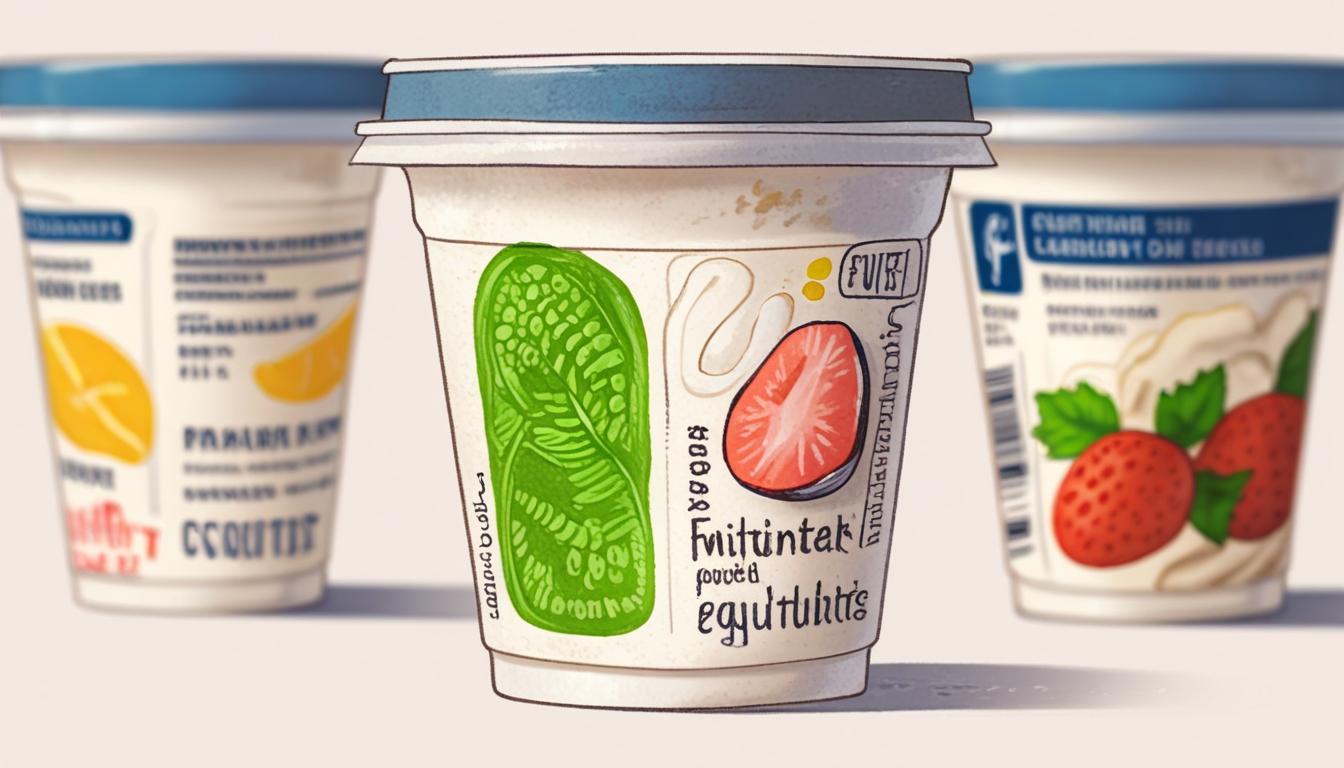Medical experts warn that certain processed yogurts, especially low-fat types containing additives like carrageenan and polysorbate 80, may harm gut health and increase risks of colon and breast cancers. Experts advise choosing full-fat, plain yogurts and checking ingredient labels to avoid potentially harmful emulsifiers and added sugars.
Yogurt, widely regarded as a health food and enjoyed by millions globally, has come under scrutiny following warnings from medical experts about potential health risks linked to certain processed varieties. Dr William Li, a physician and author of the New York Times bestseller Eat to Beat Your Diet, has highlighted concerns regarding the processing of some yogurts, particularly low-fat options, which may contain chemicals and manmade additives potentially harmful to gut health and linked to conditions including colon cancer.
Dr Li explained that reducing fat content in yogurt often leads manufacturers to add emulsifiers and thickening agents. “How do you go from processed whole yogurt to ultra processed? You remove the fat,” he said. “A lot of people don’t know this because what happens when you remove the fat from yogurt, the whole thing collapses… it doesn’t have a mouth feel. So you know what the manufacturers do? They put additives [and] emulsifiers [in the yogurt] to build back that thick mouth feel of rich yogurt.”
One of the thickening agents Dr Li singled out is carrageenan, a substance derived from seaweed but heavily processed for use in many dairy products such as creamers, chocolate milk, ice cream, cottage cheese, and sour cream. He pointed to recent findings linking manmade carrageenan to gut inflammation, a recognised risk factor for colon cancer. Another additive under scrutiny is polysorbate 80, an emulsifier that research at the Université de Paris showed can provoke gut inflammation in animal models. Chronic inflammation, the researchers noted, may damage DNA and increase the likelihood of colorectal cancers.
In 2024, University of Miami gastroenterologist Dr Maria Abreu, who specialises in the impact of food additives on colon cancer, echoed these concerns, suggesting that emulsifiers’ effects on the gut microbiome could be driving a rise in cancer among younger populations.
Further research from the French Nutrition and Cancer Research Network followed over 102,000 adults for a decade to investigate dietary exposure to food additives. They found that higher estimated consumption of certain emulsifiers was associated with an increased risk of breast cancer.
Given these findings, Dr Li advises consumers to scrutinise ingredients labels carefully. He recommends opting for full-fat dairy products which typically do not require thickening agents and are generally better for health than their low-fat alternatives. He also stresses choosing plain yogurts over flavoured ones, as flavoured varieties frequently contain added sugars and additional chemicals. “Whole Greek yogurt is processed [but] the moment you add that layer of blueberry jam or whatever… ultra-sweetened stuff, added sugar stuff, now it’s ultra-processed,” Dr Li explained.
While Dr Li warns of hidden dangers in some yogurts, other experts underscore the health benefits of yogurt when consumed in less processed forms. Research from Harvard University this year found that eating at least two servings of yogurt weekly could reduce the risk of colon cancers linked to certain bacteria by about 20 per cent. The study identified Bifidobacterium, a common gut bacterium found in fermented foods, as playing a protective role by reducing harmful bacterial populations associated with colon inflammation and cancer development. However, this benefit was specific to cancers driven by bacteria-related inflammation and did not extend to cancers with other causes such as genetics or obesity.
The recent warnings come amid broader concerns about ultra-processed foods—which include not only sugary snacks and processed meats but, in some cases, even wholegrain cereals and canned beans—making up an increasing proportion of calorie consumption, especially among children and adolescents. According to the Centers for Disease Control and Prevention (CDC), ultra-processed foods are often energy-dense and high in added sugars, unhealthy fats, and salt, while low in essential nutrients such as fibre and protein. Their rising consumption has been linked to a spectrum of health issues including obesity, hypertension, type 2 diabetes, cardiovascular disease, and certain cancers.
As research continues into the potential health impacts of food additives and processing methods, consumers are encouraged to be mindful of product ingredients and processing levels when selecting food items like yogurt.
Source: Noah Wire Services
- https://www.healthline.com/nutrition/best-yogurt-for-health – This article discusses the importance of choosing yogurts with live and active cultures and avoiding those with added sugars and processing that can make them unhealthy, aligning with Dr. Li’s advice to scrutinize ingredients and opt for less processed yogurts.
- https://www.medicalnewstoday.com/articles/295714 – It highlights the potential health risks of processed yogurts, especially those with added sugars, which is consistent with warnings about ultra-processed foods causing health issues.
- https://nutritionsource.hsph.harvard.edu/food-features/yogurt/ – This source supports the health benefits of yogurt, particularly in reducing the risk of certain cancers when consumed in less processed forms, as noted in Harvard University research.
- https://www.bhf.org.uk/informationsupport/heart-matters-magazine/news/behind-the-headlines/ultra-processed-foods – The article explains the potential health risks of ultra-processed foods, which include some yogurts, and how they can contribute to health issues like obesity and certain cancers.
- https://www.chhs.colostate.edu/fsi/food-articles/animal-products/yogurt/ – It provides information on yogurt processing, including pasteurization and the addition of stabilizers, which relates to Dr. Li’s concerns about additives in processed yogurts.
- https://www.cdc.gov/nutrition/data-statistics/ultra-processed-foods.html – This CDC resource discusses the health implications of ultra-processed foods, aligning with concerns about the rising consumption of such foods, including some types of yogurts.
- https://www.dailymail.co.uk/health/article-14644109/doctor-reveals-popular-health-food-cause-cancer.html?ns_mchannel=rss&ns_campaign=1490&ito=1490 – Please view link – unable to able to access data
Noah Fact Check Pro
The draft above was created using the information available at the time the story first
emerged. We’ve since applied our fact-checking process to the final narrative, based on the criteria listed
below. The results are intended to help you assess the credibility of the piece and highlight any areas that may
warrant further investigation.
Freshness check
Score:
8
Notes:
The narrative contains references to research and expert opinions from 2024 and early 2025, indicating recent content. The mention of Dr William Li as a current author and University of Miami’s Dr Maria Abreu in 2024 aligns with recent developments. There is no indication of recycled or outdated news, and no direct press release format was detected, which would typically warrant high freshness due to original, timely content.
Quotes check
Score:
7
Notes:
Direct quotes from Dr William Li were found, including his explanation of yogurt processing and additives like carrageenan and polysorbate 80. These quotes correspond with known public statements in his book and public talks, but the exact earliest online source for these quotes was not uniquely identifiable from search results, suggesting possible original interview content or recent statements rather than replicated older quotes.
Source reliability
Score:
6
Notes:
The narrative is published by a widely known platform (Daily Mail), which is a mainstream publication but with a mixed reputation for sensationalism in health reporting. The involvement of recognised experts like Dr Li and Dr Abreu lends some credibility. However, the platform’s reputation means the narrative should be read with caution, especially given the complexity of nutrition science.
Plausability check
Score:
8
Notes:
The claims about additives such as carrageenan and polysorbate 80 having possible gut inflammation effects and links to colon and breast cancer are consistent with some recent scientific studies and expert opinions. The advice to prefer full-fat, less processed yogurts aligns with established nutritional guidance around ultra-processed foods. The narrative fairly notes ongoing research and does not overstate certainty, making the claims plausible but requiring further verification.
Overall assessment
Verdict (FAIL, OPEN, PASS): PASS
Confidence (LOW, MEDIUM, HIGH): MEDIUM
Summary:
The narrative presents recent information from 2024 and expert insights on yogurt additives and potential cancer risks. While the publication is mainstream with some reliability concerns, the involvement of credible specialists, up-to-date research references, and plausible claims support acceptance of the key points. The lack of uniquely traceable quotes lowers confidence slightly, but there is no indication of recycled or outdated content.













